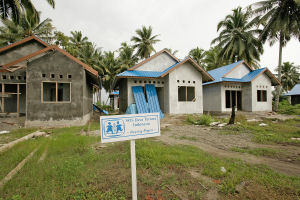Tsunami One Year on: Indonesia (part 3)
26/12/2005

The house builders of Lambada Lhok by Carola Vogl
Yusdiana is beaming with happiness. She has found bliss again. Three months ago she got married again for the second time. The lucky husband's name is Saleh. He is a tall, lean and reticent man. Yusdiana lost her first husband and three of her four children about a year ago when the tsunami came over the people living in coastal areas.
Only her eldest daughter survived; Ervi was floating unconsciously among the debris and was saved from drowning by a neighbour who pulled her out of the water onto his house's roof.
Saleh suffered a similar fate. Within minutes, he lost his wife, his four children and the few things he possessed. When the waves washed away the village of Lambada Lhok, Saleh, a fisherman, was out on the sea. It was in the morning when Saleh, like many times in the past, was asleep lying in the bottom of his boat and was completely dead-beat after a long night of high-sea fishing. Saleh slept so deeply that he did not notice anything when disaster struck completely unexpectedly and put an end to the lives of thousands of people in the region. When he went ashore with his catch the next day, he was trapped in a nightmare; the village where he had spent 50 years of his life, where he was born, where he had married and his children had been born, had been wiped out completely. Everything that was precious to him, everything he loved, had been exterminated within the twinkling of an eye.
Lambada Lhok. The name brings up pictures of music and light-heartedness in Europeans. Nothing could be more remote from the truth; Lambada Lhok was among those villages on the northern tip of Sumatra which was most heavily struck by the tsunami of 26 December 2004. Only about 700 out of 2,000 residents survived this day. Numerous children, who had characterised village life before, died; only twelve children survived the sea surge disaster. The village's mosque and minaret somehow miraculously remained untouched.
Yusdiana is happy. In about two weeks she will finally leave the emergency shelter and move to a new home with Saleh and Ervi. SOS Children's Villages is building a house for her and more than 150 other families in Lambada Lhok; a proper, solid house made of bricks, with foundations and a strong roof truss; a house that can weather the storms and will give them a feeling of protection.
Wherever you look there is hustle and bustle, and the noise of planing, hammering and plastering. In between tents and wooden huts, which were put up in quickly after the tsunami and which have housed many people for the last eleven months, new houses are growing. Thirty new homes have already been completed and equipped, and dwellers have already moved in.
Rusli, Siti and Chairil were lucky; their house was one of the first to be completed. Rusli and Siti are another young couple. Rusli was a widower when he met young widow Siti and took her as his second wife six months ago. Only Chairil, one of Rusli's five children, survived the sea surge; Siti lost all of her four children. Tears run down her cheeks when she talks about what happened with a whispering voice. Life goes on, she says, and she is grateful for the pretty new home and for the son her husband has brought into their marriage. Siti has high hopes. She would like to make use of a loan provided by SOS Children's Villages to open a small shop where she wants to sell oil, rice and household goods. Siti wants to make her own money and wants to be independent.
What is it that drives people who have lived through such a tragedy like that of December last year, to move on? What is it that gives Yusdiana and Saleh, Rusli and Siti the courage to take a chance on life and love again? How can we help those who are not so strong and courageous?
Reconstruction of destroyed homes is top priority there; still, finding your way back to a normal life requires more than a roof over your head. The people of Lambada Lhok need work as a cure for their souls; work distracts them from what they have endured, and helps them break the barrier of numbness that put a spell on so many of them. However, work is scarce there. Washing away the fishing boats, shops and restaurants, the waves also wiped out the people's sources of income. Experts agree on the fact that it will take at least another two years until Aceh's infrastructure has fully recovered. The trail of destruction left by the tsunami will take a long time to put right.
In Lambada Lhok, a women's initiative fights the numbness. At the "SOS Ladies Club", women from the village regularly meet; they cook and bake biscuits and sell them for a small profit. They elected Yusdiana as their spokeswoman and Yusdiana is strongly committed to fighting for the interests of women. SOS Children's Villages has provided the men from the village with two fishing boats. Together and without fear they once more set out onto the sea that has been feeding them for generations.
Yusdiana slips into her tent. Upon returning she is wearing a lilac dress and the traditional headgear. She wants to look pretty for the picture that will show her with Saleh in their future home. The strongest quake in the history of mankind had brought grief and destruction to Lambada Lhok, but life and love have returned to this place.
This article is part of the tsunami one year on review.
Relevant Countries: Indonesia.